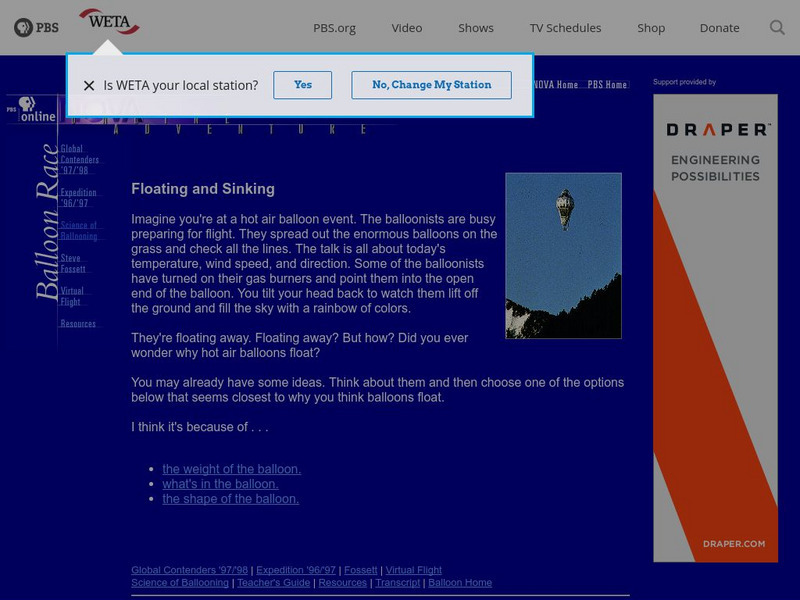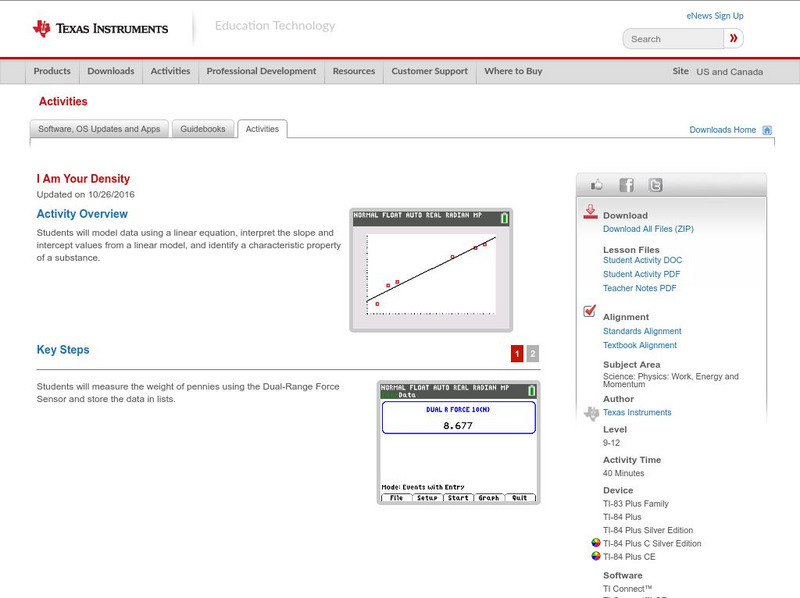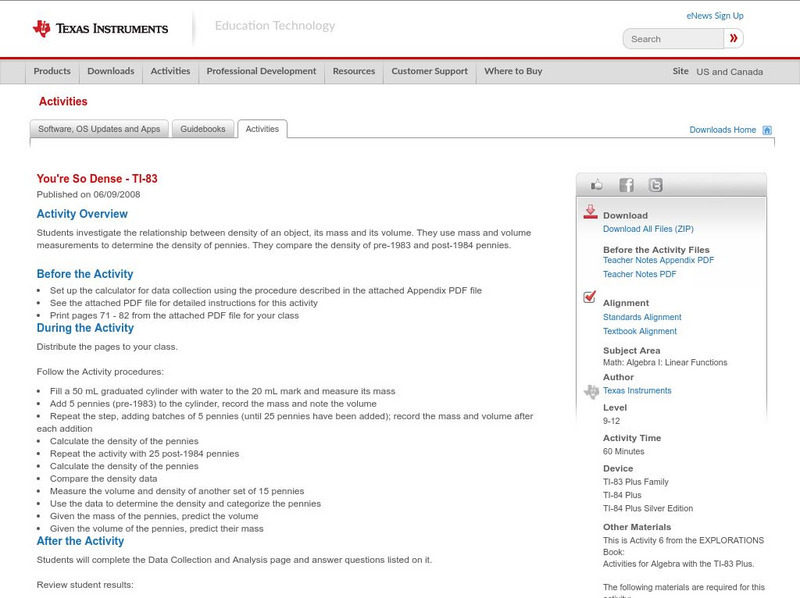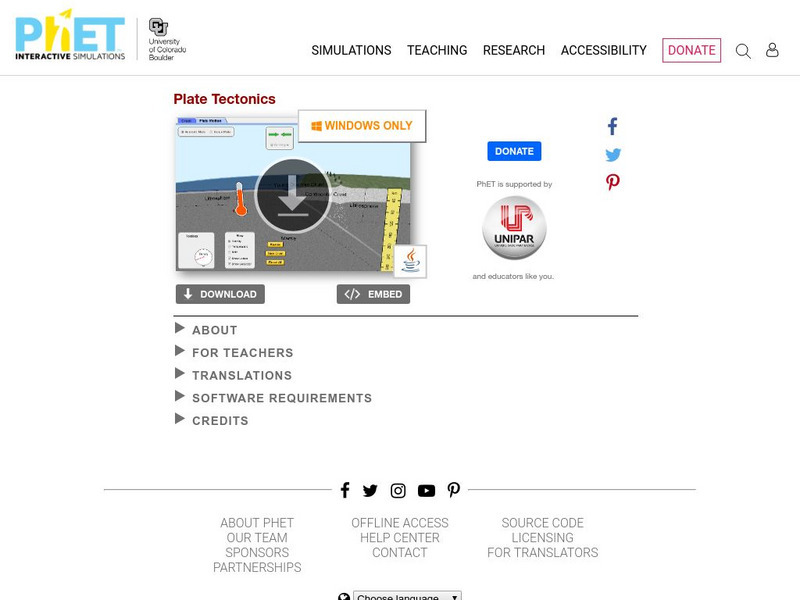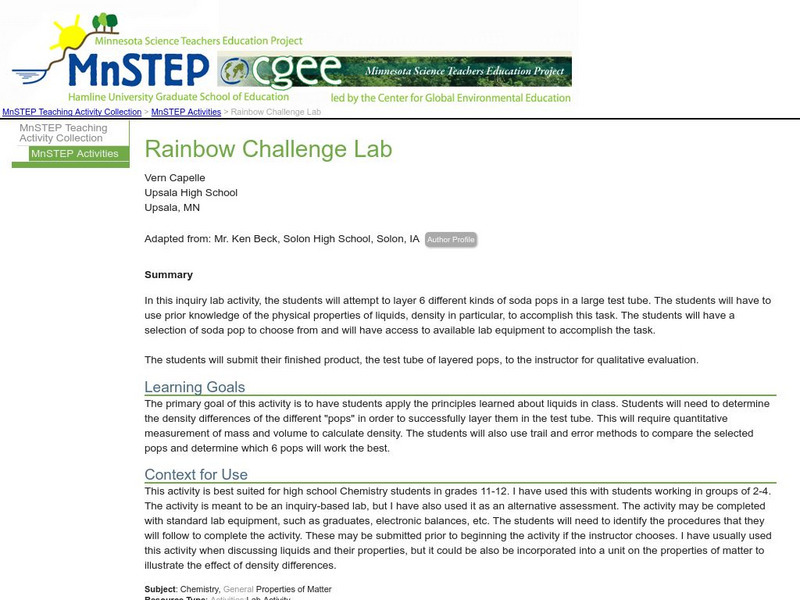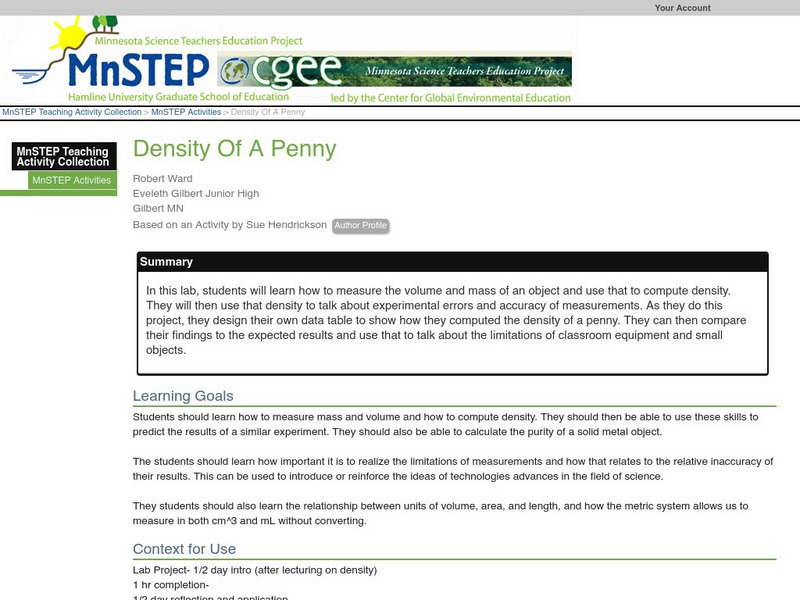American Chemical Society
Middle School Chemistry: What Is Density?
Calculate the density of cubes made of different materials to determine what type of material it contains. Using this information explain that the size, mass, and arrangement of the atoms or molecules of a substance determines its density.
American Chemical Society
Middle School Chemistry: Density: Sink and Float for Liquids
Students determine whether a liquid will sink or float in water by comparing its density to the density of water.
American Chemical Society
Middle School Chemistry: Density of Water
Learners discover the concept that density is a characteristic property of water by measuring the volume and mass of water and calculating its density.
PBS
Pbs Learning Media: Floating and Sinking: Hot Air Balloons
Why do hot air balloons float? This resource from the NOVA Web site offers a series of interactive activities that illustrates the physics of hot air balloons.
PBS
Pbs Learning Media: Matter's Physical Properties: Interactive Lesson
In this interactive lesson, learn what the "physical properties" of matter are and how can they be measured and observed.
PBS
Pbs Learning Media: Moon Formation and Earth
Students learn about the giant impact hypothesis for the Moon's formation, and how the Apollo Moon rocks have contributed to scientists' understanding of the Moon.
MadSci Network
Msn: What Regulates the Speed of Hydrogen Fusion?
From the Mad Scientist Network web site. Using a question and answer format, this page describes the various types of fusion processes and the physical requirements needed for their initiation and sustenance. Factors affecting the rates...
Exploratorium
Exploratorium: Salt Volcano
By making oil float on water--with the help of other ingredients--students can create a lava-lite effect.
Center of Science and Industry
Cosi Columbus: Buoyant Bubble [Pdf]
Learn about density in this hands-on science experiment. Includes full list of materials, procedures, and scientific explanation of what makes an object float or sink. [PDF]
California State University
Csudh: Chemistry: Converting Densities
An exercise in converting densities expressed in the metric system.
Scholastic
Scholastic: Dirtmeister's Science Lab: That Sinking Feeling
Simple experiments dealing with water temperature and density that you can complete in the lab and at home.
University of California
Ucla K 6 Physics/astronomy: Mass, Weight, and Density
This website provides explanations of mass, weight, and density with directions for building simple scales and balances. Provided as encouragement to teach these concepts to young children, it offers a good review for older students.
Texas Instruments
Texas Instruments: I Am Your Density
In this activity you will: Model data using a linear equation; interpret the slope and intercept values from a linear model; identify a characteristic property of a substance; and examine the relationship between mass, volume, and density.
Texas Instruments
Texas Instruments: You're So Dense Ti 83
Students investigate the relationship between density of an object, its mass and its volume. They use mass and volume measurements to determine the density of pennies. They compare the density of pre-1983 and post-1984 pennies.
University of Colorado
University of Colorado: Ph Et Interactive Simulations: Ph Et: Interactive Simulations: Plate Tectonics
Students studying plate tectonics will better understand its concepts with this virtual experiment that tests how plates move on the surface of the earth. Temperature, composition, and thickness of plates can be changed to create new...
Science Education Resource Center at Carleton College
Serc: Mineral Density: Teaching Accuracy, Slope, and Percent Error
Students explore the meaning of density and use their math skills to graph mass/volume data, write an equation for a line, and interpret the slope of the line. Students also find the density of two unknown mineral samples and use those...
Science Education Resource Center at Carleton College
Serc: Exploring the Properties of Liquids, With an Emphasis on Density
Students experiment with liquids; comparing and contrasting, and creating a density tower leading to a beginning understanding of density.
Science Education Resource Center at Carleton College
Serc: Rainbow Challenge Lab
In this inquiry lab activity, students will attempt to layer 6 different kinds of soda pops in a large test tube using their knowledge of density and other physical properties of liquids.
Science Education Resource Center at Carleton College
Serc: Density of Solid Objects
In this science inquiry, learners investigate whether volume or density of objects determine the floating or sinking in water. Using a rock and a block of wood teachers engage students in the discussion of density, mass and volume.
Science Education Resource Center at Carleton College
Serc: Investigating Density: Determined by Using Mass and Volume of a Substance
In this activity, students investigate the history of density, its uses, and applications. Students will generate and calculate data applying it to a graph. They will be looking at the relationship between mass and volume.
Science Education Resource Center at Carleton College
Serc: Density of a Penny
Students learn how to measure the volume and mass of an object and use that to compute density. They will then use that density to talk about experimental errors and accuracy of measurements.
Science Education Resource Center at Carleton College
Serc: Mn Step: Sinking and Floating Water
An experiment in density where colored water, both hot and cold, are poured into containers of water at room temperature. Students will observe that the warm water rises and the cold water sinks due to their different densities.
Science Education Resource Center at Carleton College
Serc: Mn Step: Solid and Liquid Density Investigation
For this activity, students investigate whether objects and liquids float or sink when placed in water. As they proceed, they will develop an understanding of what density is. Student handouts are provided.
Science Education Resource Center at Carleton College
Serc: Discovering Density Through Lava Lamps
Students first predict, then mix several liquids and then add salt to the mix, simulating a lava lamp.



